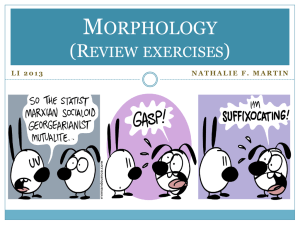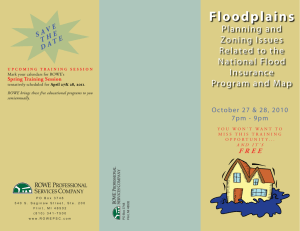UNIVERSITY OF WISCONSIN-MADISON ARCHIVES
advertisement
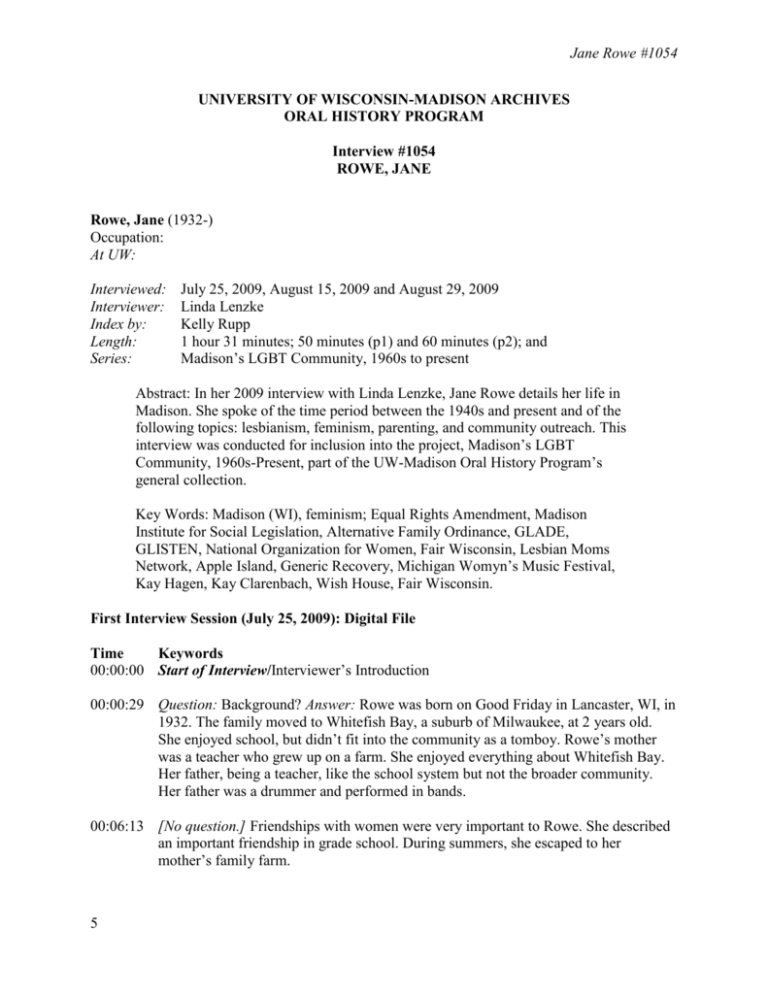
Jane Rowe #1054 UNIVERSITY OF WISCONSIN-MADISON ARCHIVES ORAL HISTORY PROGRAM Interview #1054 ROWE, JANE Rowe, Jane (1932-) Occupation: At UW: Interviewed: Interviewer: Index by: Length: Series: July 25, 2009, August 15, 2009 and August 29, 2009 Linda Lenzke Kelly Rupp 1 hour 31 minutes; 50 minutes (p1) and 60 minutes (p2); and Madison’s LGBT Community, 1960s to present Abstract: In her 2009 interview with Linda Lenzke, Jane Rowe details her life in Madison. She spoke of the time period between the 1940s and present and of the following topics: lesbianism, feminism, parenting, and community outreach. This interview was conducted for inclusion into the project, Madison’s LGBT Community, 1960s-Present, part of the UW-Madison Oral History Program’s general collection. Key Words: Madison (WI), feminism; Equal Rights Amendment, Madison Institute for Social Legislation, Alternative Family Ordinance, GLADE, GLISTEN, National Organization for Women, Fair Wisconsin, Lesbian Moms Network, Apple Island, Generic Recovery, Michigan Womyn’s Music Festival, Kay Hagen, Kay Clarenbach, Wish House, Fair Wisconsin. First Interview Session (July 25, 2009): Digital File Time Keywords 00:00:00 Start of Interview/Interviewer’s Introduction 00:00:29 Question: Background? Answer: Rowe was born on Good Friday in Lancaster, WI, in 1932. The family moved to Whitefish Bay, a suburb of Milwaukee, at 2 years old. She enjoyed school, but didn’t fit into the community as a tomboy. Rowe’s mother was a teacher who grew up on a farm. She enjoyed everything about Whitefish Bay. Her father, being a teacher, like the school system but not the broader community. Her father was a drummer and performed in bands. 00:06:13 [No question.] Friendships with women were very important to Rowe. She described an important friendship in grade school. During summers, she escaped to her mother’s family farm. 5 Jane Rowe #1054 00:10:09 [No question.] Her cousins on the farm lived a more relaxed, freer life. Her tomboy life was more accepted. She adored her grandfather and emulated his masculine walk. 00:12:13 [No question.] Rowe recognized that power rested with men. She was a militant feminist as a child. Her mother was a feminist; she ran everything like a CEO. Her mother stayed at home and made lunch every day. Seeing her mother clean the house and her social life did not make Rowe want to be a housewife. She planned to live her life differently. 00:16:48 [No question.] Rowe’s models were female teachers, particularly those in high school. She assumed some were lesbians, but she didn’t learn that term until a trip to New York during junior year of high school. That word wasn’t used in Whitefish Bay. 00:20:35 [No question.] Rowe had a crush on her female French teacher and gym teacher, but she dated boys and went to dances in high school. She was not interested in any of the relationships; they were convenient. 00:24:21 [No question.] Rowe fell in love with a boy from Montford, where she lived with her grandparents during a polio outbreak. Junior Nelson was an unacademic Norwegian farm boy. She wanted to be a farmer’s wife with six kids. It was a sexually “pure” relationship. Junior broke up with Rowe because they were different people. She was crushed. 00:30:32 [No question.] Rowe’s Grandfather became very ill and with her grandmother caring for him, Rowe was left to her own devises most of the time. In her senior year, Rowe started hanging out with a group with whom she drank alcohol and drove around drunk. This, ironically, prepared her for her college career and eventual alcoholism. She led a double life: drunk in Montford; sober in Whitefish Bay. Rowe decided to go to UW-Madison because her friend went there and she originally wanted to stay close to home. Tragically, her friend since childhood, Gingi, died from leukemia their Senior year in High School and Rowe comments that with Gingi’s death Rowe felt like her childhood died as well. 00:39:08 [No question.] At UW-Madison Rowe roomed with best friend Jo in a cramped dorm. She dated a man for most of freshman year. It was easy and comfortable, but not love. Rowe pledged Delta Gamma, a sorority to please her mother. Her “big sister” gave her a fake ID and Rowe drank a significant amount. There were blind-date events and Rowe dated a football player. 00:48:37 [No question.] While the partying and drinking in her sorority life continued, Rowe was a serious student during the week, and was in an honors program. She loved academics, especially geology. 00:53:14 [No question.] She worked for the Daily Cardinal and studied journalism. A friend from the dorms came from the Detroit area, where Rowe got an internship at the 5 Jane Rowe #1054 newspaper library for the Detroit Times. The society editor wore her slip and hat during the hot summer. That summer she lived at a YWCA type place with a girl form Kentucky who wanted to be a concert pianist. 00:58:44 [No question.] Sophomore year Rowe was also in the sorority and got more serious with her studies. One of her teachers told her not to study Journalism because she could already write. During the height of the McCarthy era in Wisconsin, Rowe had an opportunity to interview Howard K. Beale, a historian and Ogden Nash, a poet, for the Daily Cardinal. She did not feel any gender bias at the newspaper. 01:07:15 [No question.] During this era Rowe was not aware of strong attractions to men or women. Academics were her passion. During sophomore year, she met and fell in love with Lloyd Besant, a graduate student in theater. They started dating and had an affectionate but asexual relationship. This was 1951/1952. 01:13:52 [No question.] Rowe and Jo were anxious and restless so they decided to bicycle around Europe. They moved into a co-op because it was cheaper, and both got jobs in the UW Library catalogue department. Rowe describes their summer length trip, which included a 9-day ship ride to get to Europe. They slept in parks and hostels, and biked across the continent. Rowe was eager to get home to Lloyd. 01:28:56 [No question.] Rowe and Lloyd eloped in Chicago. They spent their honeymoon night at the Edgewater Hotel, which was a disaster. They moved to Wausau where Lloyd had taken a teaching job. 01:31:28 End of First Interview Session Second Interview Session, part 1 (August 15, 2009): Digital File Time Keywords 00:00:00 Start of Interview/Interviewer’s Introduction 00:00:42 Question: Continue where we left off. Answer: Rowe and Lloyd moved to Wausau, WI for him to work as a high school teacher. Rowe worked for a men’s clothing store. 00:06:30 [No question.] Rowe was uncomfortable with her role as a housewife. She cooked dinners, did laundry, and wore high heels and skirts. It horrified her that she was turning into her mother. 00:13:20 [No question.] Wausau had no local culture and most of the new teachers quit at the end of the year. They returned to Madison and Rowe started her junior year of college. Lloyd taught English at a high school. Their personal relationship was not strong. Rowe did not feel an attraction to women or men at this time. 5 Jane Rowe #1054 00:17:14 [No question.] Rowe and Lloyd went to England for the summer, hitchhiking across the country. It was freeing. They stayed with a friend’s rich family. Rowe began to think about having a family. 00:23:00 [No question.] Upon returning to Madison, Rowe and Lloyd moved in temporarily with a friend. Their downstairs neighbors were lesbians. It was her first introduction to lesbianism. 00:25:10 [No question.] Rowe started her Master’s Degree and planned for a Fulbright scholarship in New Zealand. But she became pregnant with their first child, Jacques. They were committed parents. 00:30:10 [No question.] Lloyd started having random affairs with men. It didn’t bother Rowe. Friends came over for dinner often, and Rowe liked the camaraderie. Rowe became pregnant again with their planned second child, Michele. 00:34:00 [No question.] Lloyd got sick and had to quit work. Rowe had to get a full-time job. She became a school librarian and loved it. 00:39:40 [No question.] Home life was exhausting as Rowe tried to fulfill her traditional role. Jocelyn a British woman, moved in upstairs. Rowe was very attracted to her. Maggie entered her life and they had an affair. It felt how relationships were supposed to feel. 00:45:35 [No question.] Rowe and Lloyd began to live separate lives. They began to drink heavily and fight. Their academic ambitions and children kept them together. Rowe became pregnant with their third child, Chris. Second Interview Session, part 2 (August 15, 2009): Digital File 00:00:00 [No question.] Rowe and Lloyd struggled living in the country with kids. This was during the Cuban Missile Crisis. They moved to St. Charles. Lloyd started attending church. Rowe became good friends with Michele’s Sunday school teacher, Nancy. Rowe noticed that relationships with women were significant for her whereas her marriage was not. 00:07:42 [No question.] The family returned to Madison for Lloyd to finish his PhD. Rowe became pregnant with the fourth child, Blaise. 00:09:55 [No question.] Lloyd got a 10-month assignment in New Bedford, Massachusetts. His boss’s wife, Midge, became Rowe’s best friend. Lloyd was reassigned to Evanston, IL. Rowe convinced Midge to go to library school. The house was full of kids on the weekend and Rowe loved it. 00:18:25 [No question.] Lloyd made some money on the stock market. He quit his job and they took the kids to Europe for the semester. Rowe described the trip at length. Jacques went into puberty during the trip and was disagreeable. The family spent time with 5 Jane Rowe #1054 Jocelyn in England, went to Paris, and saw beggars in Rome. They saw the Pope at the Vatican. In Mykonos, Lloyd went out with men at night. Rowe was lonely and drank heavily. 00:31:25 [No question.] The family returned to the U.S. Lloyd got a job with the board of trade in Chicago and commuted. Meanwhile they lived in Madison in a house on Regent Street. The marriage was not strong. Rowe and Elthia met again; they had an affair. 00:37:20 [No question.] Jacques was 13 and found naked and drunk on Regent Street. This was the start of his alcoholism and subsequent drug abuse. 00:39:05 [No question.] The marriage was deteriorating. Lloyd took Jacques and Michele for several weeks without Rowe’s knowing where they were. She started divorce proceedings, which took 2 years. Her relationship with Elthia continued. Elthia’s husband did not care. 00:42:30 [No question.] Elthia was a wine-maker. Rowe became a maintenance alcoholic instead of a periodic one. On Thursday nights the choir came over and they drank heavily. 00:47:00 [No question.] Once the divorce was finalized, the relationship dynamic with Elthia shifted. Rowe drank heavily each day. A friend saw her alcoholism and confronted her about it, but Rowe wasn’t interested in changing. Months later, after blacking out one night, she finally recognized her alcoholism. She went to a meeting, identified with the stories of the men there, and got sober. End of Second Interview Session Third Interview Session (August 29, 2009): Digital File Time Keywords 00:00:00 Start of Interview/Interviewer’s Introduction 00:00:17 Question: Rowe is about to describe her second marriage. Answer: 1975 Rowe fell in love with a man she met in AA named Ben. There were quite a few years between them, he being a WWII Veteran and she having been in 4th grade during the bombing of Pearl Harbor. Ben was appealing to Rowe because of his age, his being a WWII Vet and his association with AA which Rowe found to be a wonderful experience. 00:02:40 [No question.] Ben and Rowe married mostly because her parents were uncomfortable with the couple living together. Ben had three sons from his previous marriage and together with Rowe the group made a pretty happy family. Rowe, who had previously been asexual during her recovery from alcoholism, found with AA her sex drive returned and Ben turned out to be a very good partner. Ben and Rowe had lots of friends from AA threw several parties. The excitment she experienced from 5 Jane Rowe #1054 her alcohol consumption was replaced with more positive thrills like motorcycle riding. Ben and she bought motocycles and Rowe comments how besides sex, riding was their greatest bond during that time. Ben even taught Chris, Rowe’s middle child, to fix motorcycles and got him a job as a mechanic. 00:07:19 [No question.] Rowe mentions that although the marriage began within this environment of excitment it “wobbled a lot.” Ben took poor care of himself, did not eat right or exercise enough and developed many health problems. He suffered a stroke and was forced to retire which led to a very sedentary lifestyle and friction between Rowe and Ben in the house. 00:08:50 [No question.] Ben’s new life as a retiree found him slipping back into this old “womanizing” ways. Although Rowe was unaware of his affairs, she found out by a fellow AA member and friend of the couple chose to confess of her illicit romance with Ben to Rowe as part of her own recovery process. This ended Rowe and Ben’s marriage. 00:09:48 [No question.] In spite of her failed relationship with Ben, Rowe did not reject AA along with Ben, something she is very thankful for. 00:10:26 [No question.] At this same time, Rowe began falling in love with a woman, Marcia, who she worked with on a school committee. Their relationship became intense and Rowe moved in with Marcia. It was “very unsuccessful” and lasted one year. Rowe remarks that Marcia’s decision to not attend the Womyns Music Fesitval led Rowe to realize that her relationship with Marcia had ended. 00:15:00 [No question.] After leaving Marcia, and refusing to move back in with her husband, Ben Rowe found herself homeless for a period of time. She stayed with a friend until she could move back into her house on Farley Ave. 00:15:22 [No question.] With the end of “marriage number 2” and “lesbian relationship number 2” Rowe found herself on her own and she describes feeling free and that it was “really sort of fun!” She was well connected in the lesbian community and had a circle of lesbian friends. She was asked by one of these friends to look after a woman, over Christmas and New Years, who had only recently begun addiction treatment and was new to Madison. Rowe threw a New Years Eve party and invited the woman. That woman was Vij (Vera Jean), Rowe’s future long-term friend and housemate. Vij connected Rowe with Lizzards, an over 40 lesbian group. Through this group, at a party Rowe would meet Bea (71 years old), a women with whom she would share a “highly charged” romance that lasted 11 years until Bea’s death. 00:20:24 [No question.] Bea and Rowe “had many things not in common” but still the relationship was great. Bea’s friends were older and from what Rowe calls, “the Boston Marriage Era.” They were very closeted. Although they were interesting women and quite good professional role models, all being very successful in their carrers, as lesbians Rowe felt they were “dated.” 5 Jane Rowe #1054 00:21:54 [No question.] Vij and Rowe, at this time, moved Vij’s mother into their house and tried to all live together. The living situation ultimately did not work out; Vij suffered many health and emotional problems, due to her own alcoholism and attempts at recovery and these problems caused a rift between Rowe and Vij. The house was often filled with tension and Vij could have rather violent outbursts at times. At this time, too, Rowe’s youngest son was diagnosed with carcinoid cancer which was not as understood then as it is today. He was in much pain and Rowe spent a lot of time taking him to various clinics and hosptials during his three year long diagnosis and treatment. Bea was very supportive during this trying time in Rowe’s life. 00:25:00 [No question.] Once again, Rowe finds herself without a place to live. Life with Vij became too unbearable so Rowe starts looking for a new house. She found a house through a gay friend of her’s. Bea continued to live with Vij and her mother, so Bea and Rowe’s relationship was sometimes strained due to Bea’s continued involvement with that household. But overall it was a good arrangement. 00:27:07 [No question.] Feb. 22, 1994, Rowe got a call at school that Bea had been taken to the hospital after suffering a stroke that morning. Rowe’s principle allowed Rowe to leave immediately for the ER. Bea was unconscious at the hospital. The hospital gave Rowe “spousal treatment” while she was visiting Bea and Rowe comments on how only in Madison could that have happened. During Bea’s treatment and recovery she had a doctor who advocated fiercely for Rowe and Bea’s status as a couple and developed a strong bond with both of them. Her efforts paved the way for the continued spousal treatment that Rowe and Bea enjoyed throughout Bea’s recovery. 00:29:40 [No question.] Bea was ultimately discharged to a nursing home half paralyzed. She began a strenuous time of intense physical therapy. Despite her past years of athletic skill and her strong willingness to work hard, Bea could not gain the ability to walk again. Bea had suffered a heart attack while still in the hospital and a second heart attack during her time in the nursing home set her recovery back immensely. Because of her lack of response to the treatment, Medicare cut off the funding for her treatment. Faced with bills amounting to $5,000/mo for her room at the nursing home, Rowe convinced Bea to move in to her house. 00:30:30 [No question.] Bea moved into Rowe’s house. Rowe set her up in a first floor bedroom and built a ramp at the front step for Bea’s wheelchair. They even obtained a hospital bed that had once been used by Kay Clarenbach, a famous Madison feminist icon. Despite Bea’s illness and all the went with caring for her, Rowe remembers this time as a very loving time in their relationship. Bea’s mind slowly faded and friends stopped by saying their last goodbyes. Through the nursing help Rowe hired to care for Bea, they found allies in the community: a transgender nurse who identified with their being lesbian and who was the first recipient of sexual reassignment surgery at the UW Hospital, a male nurse who simply offered his help whenever Rowe should need it. Rowe was please with the level of care they found in the hired nursing help. 5 Jane Rowe #1054 00:35:40 [No question.] On the morning of Feb. 22, 1995, exactly a year to the day she had had her stroke, Rowe found that Bea had died in her sleep overnight. Rowe found much support in the lesbian community and especially the substance abuse recovery lesbian community. 00:38:20 [No question.] After Bea’s death, Rowe found a great sense of community as a single woman. She and Bea had helped establish Apple Island years before and Rowe returned to that group. She joined the Generic Recovery group at Apple Island and later helped to find a separate meeting place that became Wish House. Rowe helped to organize with other Apple Island members a Kay Hagen visit and lecture. 00:42:40 [No question.] Rowe continues her brief history of Wish House, the women-only recovery support group the grew out of Rowe’s and others desire for a women-only (and smoke free) recovery support group. The support group is still active but now only meets Tuesday nights and has about 12 members. 00:44:57 [No question.] The history of Wish House and the changes it went through parallel Rowe’s perception of what happened in the greater lesbian community over the years. She points towards a process of assimilation that occurred in Madison. As the larger city population accepted these women and they formed connections with people based on other matters besides being lesbian, the need for strictly lesbian groups and clubs disappeared. 00:46:04 [No question.] Rowe met a woman through the ongoing Wish House Tuesday night meetings who asked Rowe to be her sponsor. Rowe agreed to an initial meeting and was surprised by being given a love letter at the end of the meeting. This triggered Rowe to send a response, of course the sponsorship was impossible at that point, but Rowe was excited to pursue a romantic relationship with this woman. Their romance took off quickly and Rowe and Carol moved in together. Rowe took much pleasure in weekends at Carol’s family farm and cabin on the Mississippi River. They often invited friends to join them at parties and gatherings at the country places. Rowe and Carol are still in love and living together to this day. 00:54:11 [No question.] Rowe and Carol’s parties on the farm and at the cabin were the last of their “purely lesbian” centered lifestyle. They were old enough to have stopped all sports involvement and actively sought out a church that was inclusive but not exclusively lesbian. 00:55:55 [No question.] Rowe comments on the assimilation question again and talks briefly about her experience with assimilation at her workplace. She was part of two teacher groups at work. These groups bonded over their work or their shared experiences and interests and were made up of a mixture of heterosexual and homosexual women. 00:58:47 5 [No question.] Rowe summarizes her life today and how because of the assimilation of the lesbian culture into the greater society she has fewer outlets of lesbian connection: her relationship with Carol, her own daughter’s being lesbian and her Jane Rowe #1054 relationships (Rowe and Carol no longer attend the MI Womyn’s Music Festival but her daughter and partner always buy them souvenir T-shirts when they attend), the participation by their church in Gay Pride every year, and the recovery movement they continue with and their work with Fair Wisconsin. Rowe is writing her memoirs as well. 01:18:43 End of Third Interview Session End of Oral History #1054 5
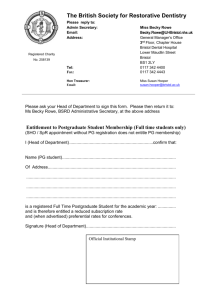
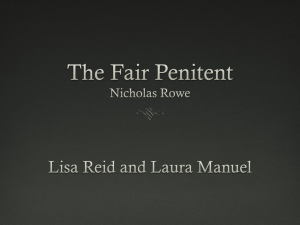


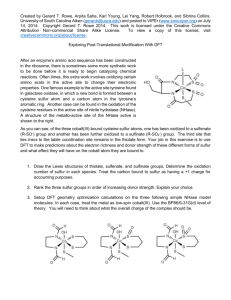
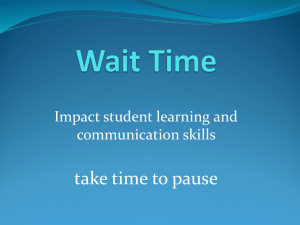
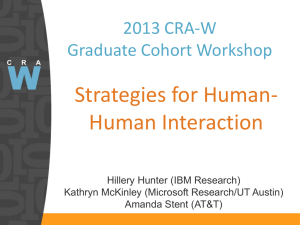
![PLEWA joint panel presentation [MS PowerPoint Document, 132.7 KB]](http://s2.studylib.net/store/data/005388913_1-9a663c909a47d520a5a627c8de595641-300x300.png)
